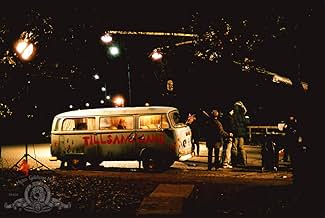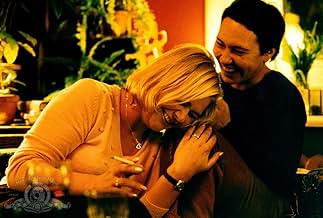ÉVALUATION IMDb
7,4/10
25 k
MA NOTE
Ajouter une intrigue dans votre langueIn 1975, the dynamics of a Swedish commune begin to change upon the arrival of a beaten wife and her two kids.In 1975, the dynamics of a Swedish commune begin to change upon the arrival of a beaten wife and her two kids.In 1975, the dynamics of a Swedish commune begin to change upon the arrival of a beaten wife and her two kids.
- Prix
- 15 victoires et 16 nominations au total
Ola Rapace
- Lasse
- (as Ola Norell)
Thérèse Brunnander
- Margit
- (as Therese Brunnander)
Avis en vedette
Göran is making porridge. For some reason this prompts him to deliver an improvised musing on the theme of Life Is Like a Bowl of Porridge, which goes roughly as follows: "We start as individual oat flakes, each with an individual shape; then we're heated and mixed and we start to blend together with all the other oat flakes; we're no longer oat flakes, but we're part of something larger - something warm, nutritious, and, yes, beautiful." Göran says this as though he's trying to convince himself. And no wonder. The porridge the camera reveals to us looks like repellent glomp.
And up until that point - well, up until a little before that point; the film's arc is like a long walk up a very gentle hill and it's hard to pick the precise moment at which we make it to the top - the collective seemed just as much a dollop of repellent glomp as the porridge. There were too many people too close together, the windows were never open, and for long stretches we never stepped outside, never even caught a glimpse of the outside. Every single room looked and felt as though it were buried in the very centre of the house. It was like living in a fetid warren, and it made me long for something cold and impersonal.
But even as we're gasping to escape we're being won over. In the end the film really IS warm, and it's the pleasing warmth of a fireplace rather than clammy warmth of porridge. The joyousness Moodysson concludes with grew so naturally out of what preceded it that the glow it casts is retrospective. I can't recall a single moment which I don't NOW (having seen the whole thing) recall with fondness.
The LOOK of the film is, in a quiet way, astonishing, except that it's so convincing you forget to be astonished. You'd swear it was shot in the 1970s. (When I saw the trailer I thought was watching an ad for the reissue of a movie that HAD been shot in the 1970s.) This is as great a triumph of art direction as any you're likely to see.
And up until that point - well, up until a little before that point; the film's arc is like a long walk up a very gentle hill and it's hard to pick the precise moment at which we make it to the top - the collective seemed just as much a dollop of repellent glomp as the porridge. There were too many people too close together, the windows were never open, and for long stretches we never stepped outside, never even caught a glimpse of the outside. Every single room looked and felt as though it were buried in the very centre of the house. It was like living in a fetid warren, and it made me long for something cold and impersonal.
But even as we're gasping to escape we're being won over. In the end the film really IS warm, and it's the pleasing warmth of a fireplace rather than clammy warmth of porridge. The joyousness Moodysson concludes with grew so naturally out of what preceded it that the glow it casts is retrospective. I can't recall a single moment which I don't NOW (having seen the whole thing) recall with fondness.
The LOOK of the film is, in a quiet way, astonishing, except that it's so convincing you forget to be astonished. You'd swear it was shot in the 1970s. (When I saw the trailer I thought was watching an ad for the reissue of a movie that HAD been shot in the 1970s.) This is as great a triumph of art direction as any you're likely to see.
This film offers a slice of life, plain and simple. The writing is so subtle and the performances are so realistic that you start thinking you're watching a documentary about life in an actual commune during the seventies in Sweden. The film is incredibly funny but also tragic, moving and honest. It's one of those cinematic journeys that show you the humor and the darkness, the weight and the ridiculousness of our mundane existence; it's a film that finds excitement in the little things (that are actually the big things once you take a closer look). A true gem of a film and a wonderful, rich experience that leaves you with a smile on your face and more insight into the human condition. 9 stars out of 10.
In case you're interested in more underrated masterpieces, here's some of my favorites:
imdb.com/list/ls070242495
In case you're interested in more underrated masterpieces, here's some of my favorites:
imdb.com/list/ls070242495
This one is certainly the best movie I've watched in my life. Casting is so natural, and the movie touches many aspects of life from politics to family disputes. Göran has the hardest job in the "family" and hardest job as far as acting is concerned. But he's totally successful. When you watch the movie, you feel like he's acting his own life. The "open relationship" between Göran and his girlfriend, the friendship between the two youngsters, and social/political issues give the movie a lot of spice. Moodyson's another movie, Fucking Åmål (Show Me Love) is also a masterpiece, but this one is more suitable for older people. Briefly, tremendous content and flawless casting.
When I bought my Lukas Moodysson 4 disc boxset, this being the second DVD in it, little did I realise that I had in fact seen Together many years before and many parts had lodged in my memory and so it was a huge pleasure to see it again - and actually own it now, too.
It's a lovely multi-faceted film that can be watched intently, or as I'm doing this time, just picking up the bits and characters I want to follow. Few movies successfully allow such freedom, at least in still giving us an overall picture. So totally un-Hollywood, with as much natural everything, including (refreshingly, these days) body hair - and I mean ALL body hair that it's impossible to get embarrassed by any of the open and frank attitudes to sex, the (now) ridiculous clothes and the Communist lifestyle of the 'Collective', as it prefers to be termed (not commune).
Battered housewife Elisabeth leaves her husband Rolf with her children and is promptly thrown into the very strange but comforting cushion as is the Collective, as Rolf pours all the alcohol down the drain and attempts to contact his wife. Slowly, through reunions with the children, they paint their view on their new life, which, as you can imagine, is often hilarious. Whether they get back together as a family unit is definitely not for me to say, though and the varying shades of this aspect is yet another of the film's delights.
Because everyone is so natural, nothing is surprising, yet individually, in another film and with a different director, many scenes would just be too way-out and off-beam. Similarly, we almost want to join them, as common-sense is painlessly drawn from us and we are enveloped by these rather strange but peculiarly likable people.
Moodysson extracts enormously natural and relaxed performances - you'd swear much of it is a documentary, yet the camera always expertly follows and ends up just where it should be, swiftly but gently. The children in particular, especially when playing is a wondrously warm treat; they're just like all kids everywhere, totally oblivious to the camera.
Together is an offbeat gem, it might not be for everyone but for anyone with a heart and soul and a wholesome attitude to life, it definitely will be.
It's a lovely multi-faceted film that can be watched intently, or as I'm doing this time, just picking up the bits and characters I want to follow. Few movies successfully allow such freedom, at least in still giving us an overall picture. So totally un-Hollywood, with as much natural everything, including (refreshingly, these days) body hair - and I mean ALL body hair that it's impossible to get embarrassed by any of the open and frank attitudes to sex, the (now) ridiculous clothes and the Communist lifestyle of the 'Collective', as it prefers to be termed (not commune).
Battered housewife Elisabeth leaves her husband Rolf with her children and is promptly thrown into the very strange but comforting cushion as is the Collective, as Rolf pours all the alcohol down the drain and attempts to contact his wife. Slowly, through reunions with the children, they paint their view on their new life, which, as you can imagine, is often hilarious. Whether they get back together as a family unit is definitely not for me to say, though and the varying shades of this aspect is yet another of the film's delights.
Because everyone is so natural, nothing is surprising, yet individually, in another film and with a different director, many scenes would just be too way-out and off-beam. Similarly, we almost want to join them, as common-sense is painlessly drawn from us and we are enveloped by these rather strange but peculiarly likable people.
Moodysson extracts enormously natural and relaxed performances - you'd swear much of it is a documentary, yet the camera always expertly follows and ends up just where it should be, swiftly but gently. The children in particular, especially when playing is a wondrously warm treat; they're just like all kids everywhere, totally oblivious to the camera.
Together is an offbeat gem, it might not be for everyone but for anyone with a heart and soul and a wholesome attitude to life, it definitely will be.
If you've ever suspected that Pippi Longstocking was a capitalist pig, Lukas Moodysson's film is for you. Set in Stockholm in 1975, this revisiting of those not so halcyon good ol' days brings us up close and extremely personal with a cast of appealing characters living close to their ideals while remaining quite human. Apparently communal life isn't all vegan dinners, late-night Marxist dialectics, and Joni Mitchell singalongs-even in Sweden. The film beautifully records the residents' foibles through the eyes of their children, who serve as the group's conscience. A disturbing, funny, moving and ultimately upbeat look at the utopia we all hoped could exist.
Le saviez-vous
- AnecdotesThe character of Birger, played by Sten Ljunggren, previously appeared in Lukas Moodysson's short film Bara prata lite (1997) which focused on him.
- ConnexionsFeatured in Si me borrara el viento lo que yo canto (2019)
- Bandes originalesSOS
Benny Andersson, Björn Ulvaeus, Stig Anderson
Performed by ABBA
With permission from Universal Music Publishing AB / Universal Music AB
Meilleurs choix
Connectez-vous pour évaluer et surveiller les recommandations personnalisées
- How long is Together?Propulsé par Alexa
Détails
Box-office
- Budget
- 17 000 000 SEK (estimation)
- Brut – États-Unis et Canada
- 1 034 829 $ US
- Fin de semaine d'ouverture – États-Unis et Canada
- 45 848 $ US
- 3 sept. 2001
- Brut – à l'échelle mondiale
- 14 596 148 $ US
- Durée1 heure 46 minutes
- Couleur
- Mixage
- Rapport de forme
- 1.85 : 1
Contribuer à cette page
Suggérer une modification ou ajouter du contenu manquant

Lacune principale
By what name was Tillsammans (2000) officially released in India in English?
Répondre






















